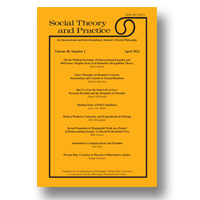|
|
|
1.
|
Social Theory and Practice:
Volume >
44 >
Issue: 3
Paul Blackledge
Frederick Engels, Social Reproduction, and the Problem of a Unitary Theory of Women’s Oppression
abstract |
view |
rights & permissions
| cited by
In this paper I argue that Frederick Engels’s The Origin of the Family, Private Property and the State remains a fundamental resource for anyone wanting to understand the oppression of women as a capitalist form. By re-examining the strengths and weaknesses of Engels’s historicisation of women’s oppression through the lens of the debates opened by second wave feminism, I argue that, once properly understood, we can overcome the limitations of Engels’s book to point to the kind of unitary theory of women’s oppression essential to a strategy adequate to the needs of the struggle for women’s liberation.
|
|
|
|
|
|
|
2.
|
Social Theory and Practice:
Volume >
44 >
Issue: 3
Daniel Koltonski
Vocations, Exploitation, and Professions in a Market Economy
abstract |
view |
rights & permissions
| cited by
In a market economy, members of professions—or at least those for whom their profession is a vocation—are vulnerable to a distinctive kind of objectionable exploitation, namely the exploitation of their vocational commitment. That they are vulnerable in this way is not a contingent fact, for it arises out of central features both of professions and of a market economy. And, for certain professions—the care professions—this exploitation is particularly objectionable, since, for these professions, the exploitation at issue is not only exploitation of the professional’s vocational commitment but also of her even more basic commitment to morality.
|
|
|
|
|
|
|
3.
|
Social Theory and Practice:
Volume >
44 >
Issue: 3
Joshua D. McBee
Circularity in Setiya’s Knowing Right from Wrong
abstract |
view |
rights & permissions
| cited by
Recently, Kieran Setiya suggested that we might respond to evolutionary debunking arguments by arguing that, even if we cannot explain our reliability in ethics, we might justify believing ourselves reliable using a track record argument. Not surprisingly, several critics have claimed that this response is circular. I consider two senses in which they might be right, concluding that, though Setiya’s argument does not beg the question, it is epistemically circular. Perhaps surprisingly, its epistemic circularity need not prevent Setiya’s argument from justifying its conclusion; nevertheless, I argue, reflection on this issue helps to bring out why realists would do well to eschew the strategy Setiya explores, focusing instead on showing that there is a suitable explanatory connection between our ethical beliefs and the facts.
|
|
|
|
|
|
|
4.
|
Social Theory and Practice:
Volume >
44 >
Issue: 3
Sascha Settegast
Prostitution and the Good of Sex
abstract |
view |
rights & permissions
| cited by
On some accounts, prostitution is just another form of casual sex and as such not particularly harmful in itself, if regulated properly. I claim that, although casual sex in general is not inherently harmful, prostitution in fact is. To show this, I defend an account of sex as joint action characteristically aimed at sexual enjoyment, here understood as a tangible experience of community among partners, and argue that prostitution fails to achieve this good by incentivizing partners to mistreat each other. To substantiate this claim, I explore ways in which prostitution fails on the virtues of temperance, respect, and sincerity.
|
|
|
|
|
|
|
5.
|
Social Theory and Practice:
Volume >
44 >
Issue: 3
Martin Sticker, Marcel van Ackeren
The Demandingness of Beneficence and Kant’s System of Duties
abstract |
view |
rights & permissions
| cited by
This paper contributes to the discussion of the moral demandingness of Kantian ethics by critically discussing an argument that is currently popular among Kantians. The argument from the system of duties holds that (a) in the Kantian system of duties the demandingness of our duty of beneficence is internally moderated by other moral prescriptions, such as the indirect duty to secure happiness, duties to oneself and special obligations. Furthermore, proponents of this argument claim (b) that via these prescriptions Kant’s system of duties incorporates into morality what current debates on (over-)demandingness call happiness and personal projects. These two claims are in conjunction supposed to establish that Kant’s ethics, at least when it comes to beneficence, is not plagued by the problem of excessive moral demands. We show that claims (a) and (b) are mistaken given what Kant says about beneficence, the application of imperfect duties and about emergencies. We finally argue that special obligations towards loved ones, a class of obligations largely overlooked by advocates of the system of duties, are the most promising candidates for internal moderation. These duties are, however, of a narrow scope.
|
|
|
|
|
|
|
6.
|
Social Theory and Practice:
Volume >
44 >
Issue: 3
Kristin Voigt
Relational Equality and the Expressive Dimension of State Action
abstract |
view |
rights & permissions
| cited by
Expressive theories of state action seek to identify and assess the ‘meaning’ implicit in state action, such as legislation and public policies. In expressive theories developed by relational egalitarians, state action must ‘express’ equal concern and respect for citizens. However, it is unclear how precisely we can determine and assess the meaning of what states do. This paper considers how an expressive theory could be developed, given the commitments of a relational account of equality, and how such a theory would relate to relational egalitarianism more broadly. I suggest that expressive considerations should be tied more closely than they are in the current literature to agents’ attitudes and to their intentions. I discuss a range of real-world policies that are problematic for what they can be taken to express.
|
|
|
|
